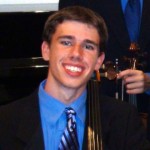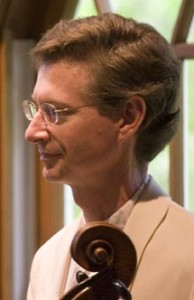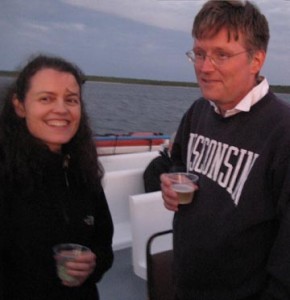
The caliber of musicianship in Door County’s Midsummer’s Music ensemble is rare, but even rarer is the friendly and fun-loving atmosphere conjured by its musicians.
It is an understatement to say that the musicians see a lot of each other; the days preceding a new concert program are often filled with several hours of rehearsal, and when the performance comes, the musicians find themselves within each other’s company from their arrival in the parking lot to their exit from the reception. In some situations, the musicians are even housed with the same host, so even after the instruments are put away they might still cross paths on the way to the shower. Such a situation has the potential to engender annoyance or frustration (especially if a performance didn’t go quite as planned), but summer after summer finds the musicians of Midsummer’s Music growing ever closer, and I can testify because I’ve lived through all of them.
The quaint villages and rich culture of Door County lend themselves to enjoyment and relaxation, and one can find Midsummer’s Music Festival’s musicians eating out together, taking hikes, or relaxing at the beach multiple times throughout the season. However, the recreational pursuits of the ensemble are not merely limited to the activities of a typical Door County vacation; with such an abundance of creative (and humorous) minds, the musicians have enjoyed themselves over the years in a variety of what one might classify as “unusual” ways. It is these tales, forever immortalized in Midsummer’s Music’s lore, that I wish to tell.

The oldest, and longest-lasting tradition is without a doubt the annual Mini-Golf tournament, which almost always takes place at the Red Putter in Ephraim. My father, Walter Preucil, was inspired to start this tradition during the first years of the festival, as his return to Door County brought back memories of the childhood summers he spent here while his parents participated in the Peninsula Music Festival. In fact, my Dad’s brother Bill (now the concertmaster of the Cleveland Orchestra) once broke his ankle while golfing at the Red putter, in an attempt to bank an apparently difficult shot off of hole number five.
It has never been entirely clear whether Dad started the annual tournament as a sort of commemoration of this event (I once saw a scorecard with the heading “William Preucil Memorial Golf Tournament, 2001”) but nevertheless it is an event eagerly anticipated by the musicians each summer. Often scheduled in the evening, perhaps after a matinee performance at the Clearing, the ensemble drives over to the Red Putter and effectively takes over the course, dividing up into groups of four or five and putting with the same high level of concentration they have just employed in a performance of a Brahms quartet.
We even have our own “Midsummer’s Golf” terms; I myself coined the term “Berken” as a five-year-old to describe a hole-in-one after witnessing Jim Berkenstock achieve such a feat. The musicians were so amused that in all the years following, they would cry out, “It’s a Berken!” every time a member of our group got a hole-in-one, to the utter confusion of other golfers and undoubtedly, the Red Putter’s owner, who looks out with interest upon our games from his small red hut in the center of the course.
After the last putt has been made, we all excitedly gather around as my Dad adds up the scores, and it is indeed with much anticipation that we listen to the results. Often there is a prize for the winner (one year the Red Putter’s owner contributed an enormous bottle of O’Douls beer) and not even the recipient of the “Booby Prize” (awarded to the individual with the worst score) can be in low spirits as the group takes off to the Red Putter’s neighbor, Joe Jo’s restaurant, for gelato and celebration.
While this beloved tradition is the only one that really involves the whole ensemble, pretty much everyone finds themselves doing some sort of “unusual” activity with someone else at some point during the season. In 2004, my Dad came up with the idea of a special challenge he called, “Lost in Door County,” which involved him putting violinist David Perry in the back of our family’s van sometime around dawn, draping a beach blanket over his head, driving him out into the middle of nowhere with nothing but his bicycle and a cell phone, and then driving away, with the “challenge” being that David would have to figure out where he was and make it back to Ephraim by breakfast.
Somewhat incredulously, David was very enthusiastic about the idea, completed the “challenge” in time to partake in a meal of scrumptious pancakes, and did the same thing to my Dad a few days later. My mother never hesitates to get into the act, either. In 2007, she joined my Dad in yet another one of his “creative” ideas: canoeing to a concert.
How could my Dad have resisted when then-MMF board member Gloria Drummond offered him her canoe just days before a performance at the Hardy Gallery, which is situated on a dock? After taking the canoe out on a test run to Horseshoe Island with bassist Jason Heath and the clarinetist that year, Wagner Campos, my Dad decided it was a go, and readied for what was to be a memorable voyage. Skeptics may dismiss this as pure fiction, but I have in my possession hard-core photographic evidence which proves that my parents, in full concert dress and with a cello case in tow, made the trek across Eagle Harbor from Nicolet Beach and triumphantly arrived at the Gallery twenty minutes before the concert began. Sometimes I wonder whether I really am related.

Of course, what history of a music festival’s “non-musical” adventures would be complete without stories of the pranks that have gone down over the years? The most famous (or should I say, infamous?) occurred in 2008 on the annual voyage across Death’s Door to a performance on Washington Island, when David and my Dad persuaded pianist Bill Koehler to take out his music for the Foote piano quintet whilst on the deck of the boat, and then “accidentally” threw most of it overboard before revealing that they had switched the music in his folder, with a copy of the part and the real one was safe and dry in Dad’s briefcase.
Bill took it in good humor, although he remarked afterwards that his heart had leapt to his throat at the moment of his music’s sudden capitulation into the watery depths. However, the other musicians took the prank to the next level when eating at Joe Jo’s after that year’s Red Putter tournament.
David had taken a rain check on the postgame celebration, and so the group persuaded one of the waiters to spray a few leftover pages of the Foote copy with water and bring it up to David the next time he frequented the pizzeria. The waiter agreed, and the next time David and his wife Isabella entered Joe Jo’s for dinner, the waiter put on a convincing act and told them that he had found the music washed up on a beach in Sister Bay. While David’s logical reasoning prevailed in the end, one can imagine the second thoughts that may have crossed his mind as he wondered whether the currents had really brought the part back across the Porte des Mortes.
Another time, while hiking to the lighthouse on Rock Island, my Dad attempted to persuade a bass player who was in Door County for the first time that the island was actually named after the famous composer, Sergei Rachmaninoff. Unsurprisingly, she greeted his assertion with much skepticism, but Dad got the upper hand when he discreetly convinced the tour guide at the lighthouse to include the Rachmaninoff detail in her lecture on the tour. The bassist was quite shocked, and I’m not sure if she ever figured it out.
Other than the obvious lesson to watch out for my Dad, if you ever take this gig, these experiences can teach us something about the art of chamber music: it’s not quite the same if the people playing it don’t get along. Performing in such a close-knit and ultimately intimate ensemble requires not only a superb level of musicianship, but mutual respect for one’s fellow artists. A piece of chamber music can only truly come alive when the musicians performing it put every ounce of their being into the music, and it takes that respect of the parts of the different instruments to gel and come together as one.
I have heard several chamber music performances where I knew that certain members of the group didn’t see eye to eye, and I would not be one to assert that the conflict of personalities detracted from what was presented. But when I watch the musicians play together up here, there is something unique about the way that they interact. It is the mutual love for what they are doing, the genuine bonds of camaraderie and friendship that they share, and the collective ability to put away their instruments when rehearsal is over and go out and do something fun. Or, even better, something unusual.
